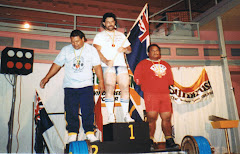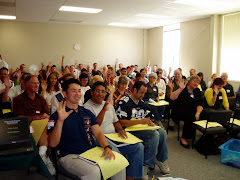We all have them, don't we?
A specific level of expectation when being served or waited on at a restaurant? A set, personalised standard, of what you can expect from fellow workmates, a product, or even the weather. If you live here in Auckland, you may actually expect the traffic on the motorway as you drive late to work, to be at an acceptable level so you can arrive on time, and also the traffic lights will turn green, at exactly the right time for you!

Sound silly? No, not really. We do this often.
We hold expectations of others, ourselves or even the natural elements of our planet. We want it to be fine and sunny so the washing can dry, or so we can go fishing with the kids or diving for Kina.
Ever given it any real thought, about how to place your expectations? How to ensure you'll never be disappointed and have your every expectation met?
Well... that's what I'm going to do here, in this brief blog on expectations.
They are, in my opinion an integral part of ensuring whether you will have a great life or a shitty one. Draw your seat in, adjust yourself, and focus your attention here on the screen and let's get to it...
Expectations Link With Emotions
If you have an expectation. That is, you have a specific desired outcome for a specific situation. You have determined how you want things to be, to turn out or to experience. In short you have a strong belief that this is how it is to be. (If you don't fit the description, then you're not dealing with an expectation).
If you get exactly what you expected then you are neither elated or sad. More like, you got it, and so you should, after all that was the expectation. So emotionally it is neither a positive or negative emotional experience for you, more a keeping of the emotional status-quo byway of your expectation being met.
If you receive more than you expected. That is, they exceeded your expectations (over delivered) then depending on how much your expectations were exceeded you will experience a positive elevation in emotion. Conversely, if your expectations are well and truly not met (under delivered) then depending on how much the shortfall is, will determine the level of negative emotion you experience, or down right highly pissed off about things!!!
Ok? Got the emotional connection now?
So what's my point?
By misplacing your expectations you can be setting yourself up for a world of horrible negative emotions on a regular basis - that's my point.
Expectations exceeded - excellent. Expectations that have fallen way short - life is absolute crap.
To free yourself from this dilemma there are specific rules that need to be in place. You'll have greater emotional management and free yourself from the trauma that can arise due to misplaced expectations by following the rules I've outlined below.
The Must Have Rules
1) You can ONLY place expectations where they can be meet with near 100% certainty:
Now where can you do that? With the weather - No! With the traffic flow at peak hour on the way home - No! With people in general - No! (please... don't tell me, your that 1 in a million that can control other people with near 100% certainty aye?) Shall we place them with the traffic lights turning green when you need them to? Got the idea? Good!
The only place you can place expectations with near 100% certainty is with.... YOU!
Have high expectations of yourself to achieve in life, to be honorable, kind, forgiving etc... And you may not know how, so have high expectations to learn how. Expect to get up each time life knocks you down. To be a good parent to your children and to treat people kindly. This you can do, can't you?
2) Expectations can only be placed on others if they are:
Made fully aware of them
Agree to provide them for you
Accept responsibility & accoutability if the are not delivered
Agree on the consequences for failing to provide you with your expectations
If you have not got each of these 4 points, then you can NOT place any expectations on another human being. Think about it. How many expectations do you have of others yet you have never discussed it with them or have had them agree to provide them to you. They could be your manager at work, work colleagues, children, friends, lover etc... think about when you were last upset with someone else. What was the expectation that wasn't being met?
If you want to have expectations of others, that's fine. You must however have agreement from them that they will both provide them for you, and also be held accountable if they do not.
Even then a warning. They are, as you are - fallible. They may not (even with the agreement) be able to deliver every time. Therefore, expect yourself to be forgiving, understanding, and supportive of them should they fall short in delivering your expectations.

3) With everything that exits outside of the first 2 rules all you can have is hope. You can hope that the traffic will be good and the traffic lights will turn green on time for you. You can hope that the weather will be fine,and the global recession will right itself soon. You can hope that people who serve you, will treat you well etc... And if these things do not happen, which you hope for, then have high expectations that you will always rise above them and remain in a good place emotionally and physically.
It'll Be A Good Place To Start
There is still much to learn about expectations. This was an introductory writing, that's all. Learn to uplift all expectations you have of others where you have do not have the 4 points I've listed above. People who have let you down, because they never lived up to them or ever new you had them, of them. By doing this, other people who do not meet those expectations will not have emotional power over you. After all, you placed the expectation on them, therefore you can just as easily remove them. If you have no agreement from them, you can not have any expectations of them.
Place hopes where you have no control, certainty or agreement. Have high expectations of yourself and monitor your progress, and be kind on yourself as you seek to realise the expectations you have of yourself. You're human, so you're bound to make the odd mistake here and there.
I have HOPE that you've enjoyed this brief intro' to expectations.














































































